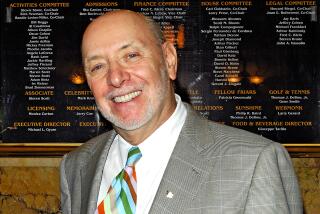Explaining Hollywood: How to get a job as an agent

- Share via
A decade ago, Chris Noriega took a leap of faith and followed his dreams to Hollywood.
“The Big Lebowski” fan quit his job at a bank in the San Francisco Bay Area, where he had made six figures right out of college. He got his MBA and then veered in a different direction from his classmates — into a role sorting mail at the Gersh Agency at the age of 31.
“The idea of going into a mailroom and starting at the absolute bottom was kind of a tough pill to swallow,” said Noriega, who is now a partner at Verve, an L.A.-based talent and literary agency. “At the same time, if I went through this change and went back to school to do something I was really passionate about, looking at spreadsheets wasn’t it.”
Although the talent representation business has been challenged during the COVID-19 pandemic, landing a job as an agent is still one of the most coveted positions in Hollywood. We talked to Noriega and other experts for advice on what you need to know about breaking into the profession.
We Can Teach You That
How to build a career in Hollywood
Join Times reporters Anousha Sakoui and Wendy Lee, as well as Bree Frank, vice president of physical production for unscripted TV at Hello Sunshine, and Phillip Sun, the president and co-founder of the management company M88, for a virtual webinar on careers in the entertainment industry. We’ll discuss the state of Hollywood jobs, how aspiring entertainers can get a foot in the door, and take your questions.
When: Tuesday, Aug. 10, 6 p.m. Pacific time
Cost: $10 for Times subscribers; $20 for non-subscribers
Tickets: Sign up on Eventbrite
What’s on your mind? Please let us know in advance of Aug. 10 about your interests and most pressing questions about working in Hollywood. Share your questions here.
Who becomes an agent?
Noriega’s life-altering decision followed the traditional path many people take to become a talent agent. It’s a plum job often described as a Hollywood matchmaker who pulls together talent for projects, negotiates deals and fiercely advocates on behalf of clients.
Key qualities to be a successful agent include a strong work ethic, refined cultural tastes, a passion for your clients — and patience. It could take years before you make it in the profession and reap financial rewards.
“We’re looking for people with an excellent work ethic,” said Noriega, who also co-runs Verve’s TV department. “We want people who carry themselves with integrity. People with great taste. But the big thing is we want people who love this business. People who have a clear passion for entertainment. You can teach people how to negotiate deals and pitch clients. But you need that baseline of work ethic, positive attitude and passion.”
How do you get started?
Noriega, like many agents before him, got his start in the mailroom, printing and binding scripts. He had no ties to the industry and wondered if he’d be walking into a real-life version of the HBO series “Entourage.”
The fast-paced agency life isn’t for everyone. The traditional steps of working up to being a talent agent — first as a mailroom clerk, then as an assistant, graduating to coordinator and eventually agent — often involve working long hours and begin at low wages.
After years of low wages and abuse, Hollywood assistants are in open revolt over their treatment.
The cost of living in L.A. can be expensive. To make ends meet, Noriega relied on his wife, who worked at a tech company to help support his dreams. Others choose to live with their parents.
After a month or two of working in the mailroom, Noriega became an assistant for Bayard Maybank, rolling phone calls, setting up meetings and reading scripts.
He was bracing for an environment similar to the one depicted in “Entourage,” where Ari Gold screams and everyone freaks out and is on high alert.
Although he says that type of agent exists, Noriega was relieved that Maybank didn’t operate that way. Maybank was down to earth, loved movies and reading scripts, and operated from passion, excitement and positivity — not fear and aggression, Noriega said.
“So that was like, ‘Oh, OK, you could be this way as an agent,’” said Noriega, who became an agent at Verve in 2013. “You don’t have to be like a maniac person.”
Rejection and uncertainty are part of working in Hollywood, but joy, creativity and fun can be too. Here’s how to manage your mental health.
What are the paths you take once you get going?
For starters, there are many different types of agents. For example, at Beverly Hills-based talent agency WME, agents can work in multiple fields, including music, television, sports, motion picture and comedy.
Elizabeth Wachtel’s passion for storytelling led her to become a literary packaging agent at WME. Wachtel grew up in Los Angeles reading and watching the Harry Potter novels and movies. Now, she spends her weekends curled up reading books that could possibly be adapted to Hollywood films and TV shows.
“My 15-year-old self would think this is the coolest job ever,” said Wachtel, 33. “I was a really shy kid and really didn’t come out of my shell until I discovered theater and got hooked on storytelling.”
Two years ago, Wachtel was a WME coordinator and agent trainee when department heads asked her to read a book proposal for “Finding the Mother Tree,” a memoir by forest ecologist Suzanne Simard. She concluded that its story could be adapted into a Hollywood film. After she became an agent in 2019, she took the book into the marketplace and in March was instrumental in closing a deal for the book’s movie, starring critically acclaimed actor Amy Adams.
“That was my role in the process — kind of like a matchmaker,” Wachtel said. “That’s the sort of thing that when I get up in the morning it makes me smile and gets me out the door.”
At Verve, a typical day for an agent involves a staff meeting, and then it’s split into three different sections. If the agent is in charge of covering a certain network, they talk to executives and find out the latest information, Noriega said. Agents also spend time checking in with clients and then signing, finding and identifying new clients that they would like to be in business with.
“Depending on what stage you’re at in your career, you’re going to spend more time in one bucket versus the other,” said Noriega, who works 60 hours a week.
Agents have a key responsibility in Hollywood — helping talent find jobs. In California, only licensed agents can procure work.
“You’re guiding people’s careers,” Noriega said. “If you make a mistake, if you miss something, someone doesn’t get a job. This is how people pay for their mortgage and how people send their kids to school, and so you have to recognize that’s the responsibility you have on your hands, and treat it with that kind of respect.”
How do you make money and what kind of money?
Agents earn a base salary and bonus based on their performance and commission from the deals they close for their clients, so part of their success is also based on the success of the talent they represent.
The payoffs can be big. Base salaries can start in the five-figure range, but many senior agents make seven-figure salaries.
Talent agencies are under growing pressure to raise capital to finance growth at time of rapid changes in the media industry. The rise of streaming and expected decline of TV packaging, combined with the effects of a longstanding boycott by Writers Guild of America, have put the squeeze on talent agencies, some of which have laid off workers.
How is this career different from 10 years ago?
The rise in streaming platforms has caused big shifts in the industry. As TV seasons have gotten shorter, agents have had to work harder to find jobs for their clients.
The way people entertain themselves has also evolved into areas like podcasts and short 15-second videos on social media. Agents have to continue to keep their pulse on the latest trends and be cognizant of how to make money for their clients.
Agencies are also undergoing cultural shifts, as Hollywood has faced a reckoning over the treatment of women with the #MeToo movement and calls for workplaces to get rid of bullies. The police killing of George Floyd last year has also spurred entertainment companies to confront their lack of diversity.
Current and former employees of ICM Partners allege that the talent agency tolerated harassment and misconduct toward women and people of color.
Some agencies have a reputation for being mostly white, male workplaces and are stepping up in their recruitment efforts to diversity their ranks.
What advice do pros always hear that’s wrong?
Some agents said it’s important to push back on the anxiety that builds from people who feel they have to be the youngest and the fastest and build their client lists right away once they become an agent. It’s important to take time to develop those skills because it takes years to learn, Noriega said.
“It’s a small town and you build a reputation for yourself. It will determine how your career plays out,” Noriega said. “You can start signing clients, but you don’t really know what you’re doing right away. If you mess up, if you make a mistake, that can haunt you. That can affect your credibility out there.”
Daniela Federman, a 27-year-old TV scripted agent at WME, recommends reading and watching as much as possible to better identify your personal tastes.
“Do the work, be prepared,” Federman said. “Google the person you’re meeting, who they’re representing, who they work with, listen to the podcast that they’ve done.”
What’s some good advice?
Agents say that a key part of landing the job is believing in yourself and putting in the hard work.
Erica Ling started her agency career as a licensed attorney who realized she really wanted to be an agent. Ling is the only WME agent fluent in Mandarin.
“It’s scary to get into an industry where you don’t know anyone and you don’t know what the rules are, but I would recommend that people bet on themselves,” said 32-year-old Ling, a motion picture literary agent. “The worst thing is that somebody says no or doesn’t take you for an internship or ignores your email, but you have to really try to put yourself out there, because if you’re not willing to bet on yourself, no one else will be, particularly in an industry where everyone‘s trying to get in.”
Film producers will tell you that there’s no typical day in the job -- and there’s no single path to becoming a producer. But there are traits you can develop and entertainment industry paths to follow that will set you up for a career in Hollywood.
More to Read
Inside the business of entertainment
The Wide Shot brings you news, analysis and insights on everything from streaming wars to production — and what it all means for the future.
You may occasionally receive promotional content from the Los Angeles Times.
















